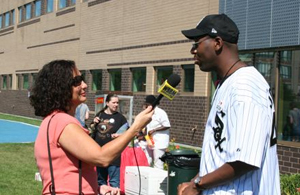by Beth Finke
When you get a chance, check out this article in Newsweek about Kristina Chew’s reaction to Sen. John McCain’s mention of autism in last week’s debate. You might recognize Kristina Chew’s name — she writes the Autismvox blog. I read that blog almost every day and have referred to it many times in my posts here.
Kristina Chew is an assistant professor of classics at Saint Peter’s College in Jersey City, N.J., and her son, Charlie, 11, has autism. Newsweek went to her to get “a mother’s reaction.”
What did you think of Senator McCain’s debate comments?
Kristina Chew: Very puzzling. It seemed that he was conflating autism and Down syndrome. Certainly, parents of kids with autism and Down syndrome have tons of overlap in our concerns, but they’re very different conditions. I found that troubling. And the comments he made about autism, they seem to betray a lack of knowledge or understanding about the kinds of things that autistic children need. It almost seemed to be a rhetorical statement. To be really cynical, it’s as if he’s playing a sympathy card. He’s sentimentalizing the children, but not looking at how we can help them, how we can teach them, how we can make things better.
But Palin does have a special-needs child.
His statement that Sarah Palin understands the challenges better than anyone else, I thought that was very unfortunate for him to say. It’s just incredibly presumptive. I don’t think we really have a sense yet of how Palin understands special-needs children.
Why not?
I think every parent of a special-needs child, we all want to feel that we’re experts, that we all do know better about our child. But I think in reality often we don’t. What I knew about autism when Charlie was an infant, a toddler, is nothing like what I know about it now. We’re all looking for answers,
for solutions, for better therapies and schools for our children.
There’s a lot more in the article, and its well worth reading. What was most interesting to me, though, is that Newsweek went to a blogger as an expert.
We’ve come a long way, baby!








